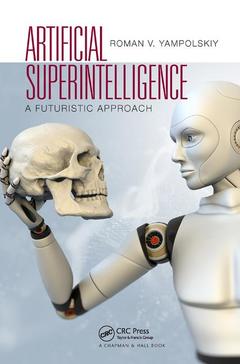Description
Artificial Superintelligence
A Futuristic Approach
Author: Yampolskiy Roman V.
Language: English
Subjects for Artificial Superintelligence:
Keywords
Superintelligent Machines; Artificial Superintelligence; Artificial intelligence (AI); AI Safety; Computer security; AI System; Cybersecurity; Ai Problem; Intelligence singularity; Friendly AI; Singularity paradox; Human Level Intelligence; Future predictions; Machine Ethics; AI-Completeness; Superintelligent AI; Eliezer Yudkowsky; Turing test; Recursive Self-improvement; Wireheading in machines; Turing Machine; Self-improving software; Kolmogorov Complexity; AI safety engineering; Virtual Machines; UTM; Robot rights; Software Agents; AI confinement problem; Reward Function; Future superintelligence; Confinement Environment; Mind Designs; Cellular Automata; Global Catastrophic Risks; Brain Computer Interfaces; Lysergic Acid Diethylamide; Solve Np Complete Problem; Theoretical Artificial Intelligence
Publication date: 06-2017
· 15.6x23.4 cm · Hardback
Publication date: 08-2015
· 15.6x23.4 cm · Paperback
Description
/li>Contents
/li>Readership
/li>Biography
/li>
A day does not go by without a news article reporting some amazing breakthrough in artificial intelligence (AI). Many philosophers, futurists, and AI researchers have conjectured that human-level AI will be developed in the next 20 to 200 years. If these predictions are correct, it raises new and sinister issues related to our future in the age of intelligent machines. Artificial Superintelligence: A Futuristic Approach directly addresses these issues and consolidates research aimed at making sure that emerging superintelligence is beneficial to humanity.
While specific predictions regarding the consequences of superintelligent AI vary from potential economic hardship to the complete extinction of humankind, many researchers agree that the issue is of utmost importance and needs to be seriously addressed. Artificial Superintelligence: A Futuristic Approach discusses key topics such as:
AI-Completeness theory and how it can be used to see if an artificial intelligent agent has attained human level intelligence
Methods for safeguarding the invention of a superintelligent system that could theoretically be worth trillions of dollars
Self-improving AI systems: definition, types, and limits
The science of AI safety engineering, including machine ethics and robot rights
Solutions for ensuring safe and secure confinement of superintelligent systems
The future of superintelligence and why long-term prospects for humanity to remain as the dominant species on Earth are not great
Artificial Superintelligence: A Futuristic Approach is designed to become a foundational text for the new science of AI safety engineering. AI researchers and students, computer security researchers, futurists, and philosophers should find this an invaluable resource.




